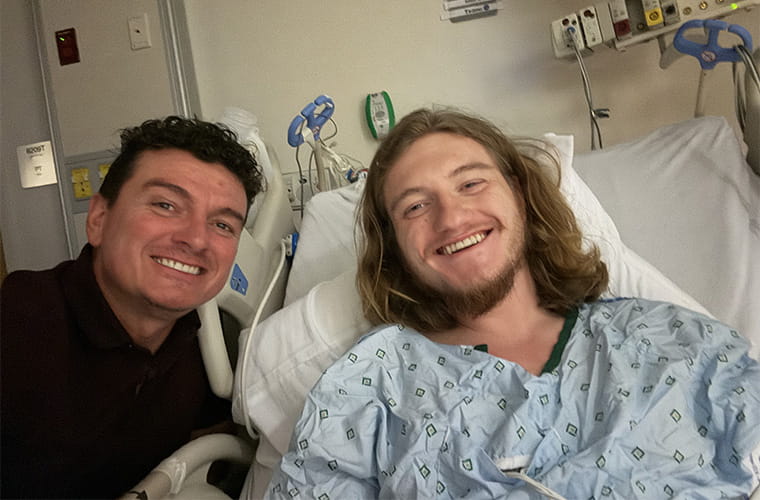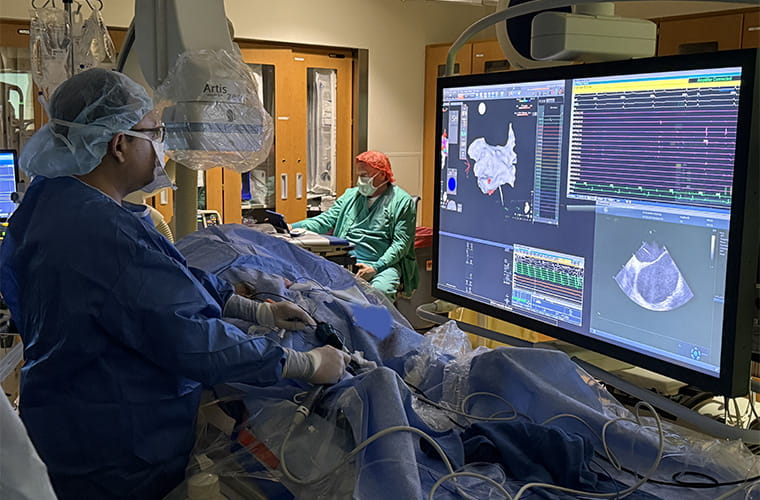BayCare Doctors Help Father, Son Battle Rare Gene Linked to Sudden Cardiac Arrest

Looking at statistics, neither Clay Emerton nor his 26-year-old son Andy Emerton should be alive today, but thanks to the expertise and dedication of BayCare doctors, they are.
In 2018, Clay Emerton was experiencing periods of weakness. He ignored it until he couldn’t. His fiancé took him to a BayCare Urgent Care where the medical staff told him to get to the ER immediately.
Clay Emerton was 42 and in good health. He couldn’t imagine the uneasiness he was experiencing was anything too serious, but when he checked in at BayCare’s St. Joseph’s Hospital ER, his heart was beating more than 250 beats per minute.
“The triage nurse seemed confused that I was even conscious,” he recalled.
He was experiencing ventricular tachycardia (VT), a condition in which the heart beats too fast, leading to ventricular fibrillation (VF) causing his heart ventricles to quiver. These conditions, when sustained, result in insufficient blood flow to the body and can cause sudden cardiac arrest.
The ER team had to shock his heart multiple times to get it back to a sustainable normal rhythm. Normally, VT and VF happen when the heart has been weakened by a heart attack. But his heart showed no indication of a heart attack, and he had never experienced any other symptoms that would suggest he had an issue with his heart.
While the care team couldn’t pinpoint a reason for Clay Emerton’s VT and VF during his several-day stay at St. Joseph’s Hospital, the attending electrophysiologist, an extensively trained cardiologist specializing in treating heart rhythm disorders, implanted a subcutaneous implantable cardioverter defibrillator (S-ICD) to detect abnormal heart rhythm and shock his heart if it started beating uncontrollably again.
Clay Emerton Finds Answers and Support
That electrophysiologist also encouraged him to undergo genetic testing. The results indicated a desmoplakin gene mutation. Desmoplakin is a protein that is critical to the correct function of the cardiac muscle. Knowing his heart issue was genetic, he had his mother, two daughters and son also undergo genetic testing.
His mother, son and oldest daughter learned they have the gene mutation, but none had experienced any cardiac issues and led normal, healthy lives.
“Knowing you have this mutation is just something you live with,” Clay Emerton said. “You don’t have signs and symptoms, and there isn’t anything to treat. Usually, you learn you have it when you experience cardiac arrest, and only about 10% survive that.”
“I was fortunate to get to St. Joseph’s Hospital’s ER before I went into cardiac arrest and get immediate treatment and the defibrillator,” he added.
St. Joseph’s Hospital was recently named one of the 50 Top Cardiovascular Hospitals® in the nation by Premier, Inc., a testament to the expertise and dedication of its heart care team.
Since 2018, his defibrillator has had to shock his heart, and he has continued to have other issues, including an increasing number of extra heartbeats that disrupted his regular heart rhythm. These premature ventricular contractions, or PVCs, can also lead to VT.
“I just wasn’t comfortable with the increasing frequency of the PVCs and my defibrillator was occasionally malfunctioning and would inappropriately shock me when I didn’t need it,” he said.
In 2023, he spoke to his BayCare Medical Group primary care physician Daniel Dodard, MD, about the issue. Dr. Dodard suggested Clay Emerton go to BayCare Medical Group Cardiology Tampa where he started working with Electrophysiologist Shalin Shah, MD, and Cardiologist Piyush Sovani, MD.

Those steps helped improve his quality of life.
“Dr Shah listened to my concerns and found solutions that improved how I was feeling,” Clay Emerton said.
Andy Emerton Survives Sudden Cardiac Arrest
The rest of the family seemed unfazed by the genetic issue until a few months ago when his son Andy Emerton experienced sudden cardiac arrest.
While spending the weekend with friends in Gainesville, Andy Emerton suddenly fell on the floor. One friend started CPR, and the other called 911.
Paramedics worked on him and rushed him to a nearby hospital.
His friends called his dad who quickly got on the phone with the ER team in Gainesville.
“I told them about the gene mutation,” Clay Emerton said. He also strongly advocated for his son to receive the same defibrillator he now has, which allows for pacing the heart as well as shocking the heart.
“There’s usually a push for younger people to receive the less invasive S-ICD, but I felt that Andy’s situation needed what I had, higher accuracy and the ability to pace,” Clay Emerton explained.
“Because of Dr. Shah, I was able to advocate for my son to get the defibrillator that has proven best for him,” he added.
Andy Emerton experienced a second cardiac event in January, and the defibrillator saved his life.
“I was sitting on my bed having a phone conversation with my best friend when I got lightheaded and laid on my bed,” he said. “When I woke up, I found out from my electrophysiologist’s office that my heart rate went from 65 BPM to 350 BPM in a beat. The defibrillator shocked my heart back into rhythm.”
His electrophysiologist is in the same medical group as Dr. Shah. The office receives data from their patients’ defibrillators and monitors it for extraordinary events like Andy Emerton experienced in January. That event prompted his electrophysiologist to increase his medication and change his resting heart rate from 60 BPM to 80 BPM, explaining to him that when the resting heart rate is too low, sometimes the heart can more easily go into a strange rhythm.
Andy Emerton looks back on the last few months knowing he could have easily died.
“If I were 20% less fun to be around, my Gainesville friends wouldn’t have wanted me to stay,” he teased. “I would have gone home, and I live alone. My jokes saved my life.”
Clay Emerton is thankful he found doctors who listen and have the expertise to provide the best possible care for him and his family. He and his son are taking antiarrhythmic medications and relying on their defibrillators to ensure their hearts keep beating. They also hope to be seen at an arrhythmogenic right ventricular dysplasia program in Baltimore. The program is internationally recognized as the largest clinical and research center dedicated to rare familial disorders that may cause VT and sudden cardiac death in young, apparently healthy individuals.
“I am so grateful to Dr. Dodard and Dr. Shah for their willingness to go the extra mile to help me in every way,” Clay Emerton said. “My condition is rare, but they always take the time to listen and look for solutions to improve my quality of life and ultimately keep me alive. Their guidance has helped me help my son.”
Learn more about BayCare’s exceptional heart care: BayCare Heart and Vascular Institute
